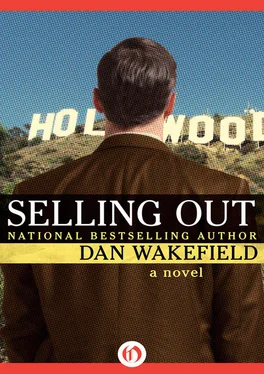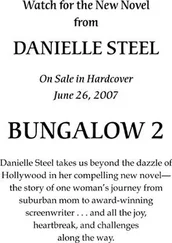Kling went even further in his effort to do all he could to aid Perry’s blighted attempts at writing the psychic dog script. He got him an office to work in. Kling had another picture in preproduction on the Unified lot, and he secured a room in one of the barrackslike buildings for Perry to work in. He even arranged for Perry to pick out his own furniture from the constantly shifting pieces in the studio warehouse.
Perry lay on the soiled red couch, trying to think through a scene. The couch, a straight-backed wooden chair, and one of those mammoth old-fashioned desks were the only objects in Perry’s new office. He did not try to spruce it up or personalize it with any pictures or posters on the wall. That stuff was for hicks who didn’t understand the fleeting nature of the business. He was a veteran now. Or becoming one fast.
He did not use the coke any more, simply because it hadn’t worked. It only gave the illusion it worked, and that was finally worse than the blank piece of paper. Perry was so pissed off at having fallen for the coke he even stopped using it at night, for fun. He simply drank wine and smoked grass, but he didn’t do those at work, not while he was trying to write.
He was doing the script cold turkey.
Or trying.
Larman was trying to help. He was dropping in every day and trying to inject his own ideas into Perry’s blank brain.
Perry sat at the typewriter and made himself write. After a while, exhausted, he would have to lie down on the soiled red couch. He tried to think about what he was doing, tried to understand why the hell it was so damn hard.
He was being paid to spread his mind, to force it to open against its own instinct, to accept the entry of an alien idea.
This hurt.
Well, what the hell did he expect, hadn’t he read about it all his life, wasn’t it one of the oldest cliches in the book, the hoariest and the whoriest? Ha. But it wasn’t so funny now, not so glib and easy as it was in jokes and objective journalism, for now it was happening to him . This ache was not academic, it was— ugh —ugly, radiating real pain that spread and burned to the core, the private center, the self.
The pulsating pain was all the worse because Perry knew he himself had caused it. He had sought this violation, had invited, for pay, the intrusion of a foreign mental object (the dog of a script) into the very inner sanctum of the psyche, the delicate creative part of it. Of course it would hurt, he knew all along it would hurt. He expected the pain, was ready for it. He planned to do simply what people have done in such situations for centuries—close his eyes and brace himself, grit his teeth and think of the reward, the blessed benison, the life-sustaining money .
But you don’t get paid just for closing your eyes and letting them shove their merchandise up your mind.
Once they stick it in you, you have to nurture and feed their seed, shape it and make it grow as if it were your very own—but you have to make sure it comes out according to their image, the specifications of what they want, what they are paying you to deliver.
Perry understood this, he knew the rules of the game and had every intention of obeying, yet now in the very act, he was struck by the fear that he might not be capable of carrying it out, of completing his part of the bargain.
Dizzy with fear, he got up from the couch and forced himself back to the typewriter.
Failed television writers who live in the Valley .
He tried not to think.
He made himself write. After two more weeks of this he handed in twenty new pages. He waited. Waited for the phone to ring. Waited for Larman Kling to knock at the door. On the fourth day of waiting he went in to the studio, started up the stairs to his second-floor cubicle, and was pushed out of the way, pressed against the wall by two moving men.
They were carrying out the soiled red couch.
“Hey, that’s mine!” Perry protested.
“You in room two-twenty-seven?” one of the movers asked.
“Yes! I’m working for Mr. Larman Kling—you better call his office and get this straightened out.”
“His office is who called us,” the other mover said. “Told us they wouldn’t be needing that space any more.”
That’s how Perry found out he was fired.
They took away the furniture.
Of course Kling’s business affairs people settled up with Ravenna, paying almost the full price of the aborted script.
“What the hell do I do now?” Perry asked.
“’et back on the ’orse,” Ravenna said.
“What? I can’t understand you.”
“Sorry, I was flossing. I said you ought to get back on the horse that threw you.”
Of course. What else could he do? Turn tail and run?
The word went forth that Perry Moss was “available.”
That was the official designation of his situation within the Industry.
It sounded more dignified than “unemployed” or “looking for a job” yet it still made Perry cringe. He felt like a woman who was being described as “easy,” or “looking for some action.”
Anything .
Well, that wasn’t the case, dammit.
He was going to be particular. He should never have taken the job with Larman Kling in the first place. At least he had salvaged thirty grand from the psychic dog fiasco, and even though after he paid all his percentages and taxes that would come to around seventeen-five, that would carry him a few more months in his new, reduced Valley style of living.
He made the rounds.
Of course he was back to the world of television. There was no use trying the powerful producers of features again, not after having been fired off his first feature, but even though the word was out all over town, he was graciously welcomed to meetings by the people who produced television shows.
He took his notebook and briefcase and he listened to their ideas. There were ideas based on popular songs, on magazine and even newspaper articles. There were ideas based on what a producer’s ten-year-old son had said at breakfast, or what happened to a network executive’s maiden aunt on her Jamaican holiday, or the childhood fears of a director’s TV repairman’s cousin’s plumber. There were ideas out there everywhere, like dust motes, as plentiful and also as ineffable as phantom butterflies or ghosts.
He made a list of tag words of some of the ideas he’d been pitched: Gay, Geese, Gangs, Roller Derby, Rape, Circus, Camp, Cult.
None of them grabbed him.
He was going to keep looking.
“What are you waiting for?” Ravenna asked, “the perfect wave?”
Not even her gibes made him panic.
He was going to wait, and in the meantime, he was not going to waste his time.
He was going to try writing his own stuff again. You didn’t have to have an assignment from a studio or a network to write a short story. You didn’t even have to make a deal with a magazine. All you had to do was sit down and write the damn thing.
So, between meetings, Perry tried to sit down and write some short stories.
The trouble was, they kept coming out like scripts.
Instead of being able to write a simple, descriptive sentence to begin a short story, like “The freckle-faced kid named Sammy walked out his front door and picked up the morning newspaper,” it came out like this:
FADE IN
EXT—SAMMY’S HOUSE—DAY
A freckle-faced boy, SAMMY, walks out the front door of his family’s house, looks around, sees the morning paper, stoops down and picks it up.
SAMMY
(to himself)
I wonder how the game came out?
MOTHER
(voice-over)
Sammyl Come to breakfast, dear!
And on and on.
Except it didn’t go on and on.
It stopped.
Читать дальше












